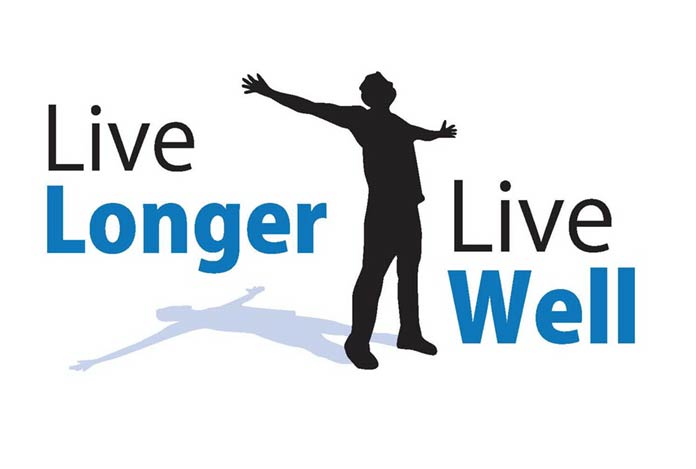Habits to live long life
Everyone wants to live a long life but few people get success to live long life, why? The answer is very simple but hard to adapt in daily routine. There are a number of things you can resolve to do in order to "slow down" your biological clock and live longer, whether you’re in your 20s or 30s, all the way to your 60s, 70s, and beyond. In fact, research has shown it's never too late to start healthy habits. No matter what your age, you have the power to change many of the variables that influence how long you live, and how active and vital you feel in your later years. Actions you can take to increase your odds of a longer and more satisfying life span are really quite simple:

Necessary tips to live long life-
1. Picking up a hobby:
Many people find themselves stuck in a daily or weekly routine that offers little more than a "rinse and repeat" type life. This is great because you can stick to a schedule and always know what to expect, which makes life easy to just sail through. But what happens when that routine just gets so dull and overly predictable.
One of the benefits of having a hobby can help relieve stress while allowing you to do something that you enjoy. Spending time doing an enjoyable activity that is not attached to work or other commitments will help increase your happiness and satisfaction with life. It will allow you to spend time doing something that is only for your own personal benefit, and not the benefit of others. Hobbies prevent stress and boost your memory therefore its help to live a long and healthy life. An increasing number of studies have found the surprising mental and physical health benefits of gardening.
2. Stay Married:
If you are married, you may have discovered why marriage is so important and experienced some of the good that comes from it. Or, maybe marriage was hard for some of you and you’re no longer married. However, there is hope. But that hope starts with realizing that marriage can be more amazing than you have experienced or even thought.
But we figure that just the fact that you got hitched is reward enough since you'll be living longer as a result. A 2013 study by Duke University Medical Center published in the Annals of Behavioral Medicine revealed that being married reduces the risk of premature death in midlife. The study looked at 4,802 people and those that were married through their middle decade were less likely to have an untimely demise. Researchers surmised that the act of having a partner to lean on and work with through any challenges faced in midlife make that era of life much easier to deal with.
3. Stay connected:
People who have a social network as in real-life friends, family or other community have a tendency to live longer. One study found that widows, for example, live longer that widowers and still-married women because of the social bonds they form with other women.
Staying social can be a good longevity booster, mostly by helping you manage stress and by strengthening your immune system. Good relationships keep you strong, while bad relationships can leave you in a negative frame of mind, and put you at risk of depression and even heart attacks.

Staying connected can be a tough one if you are feeling down, have lost someone close to you, or live far away from extended family and friends. There are ways to re-engage and meet new people even if you are in a new city, including volunteering and reaching out to others with similar interests through networks like business groups and book clubs.
4. Take a walk:
The benefits of a daily walk are many and include significantly reducing the risk for developing Type-2 diabetes, stroke and dementia. But walk briskly. Walking is good cardio exercise — if you go at a brisk pace of at least 3 miles per hour. Cardio or aerobic exercise works your large muscles over and over and pushes your heart and lungs to work hard. This can lower your resting heart rate and blood pressure. Walking is good cardio exercise — if you go at a brisk pace of at least 3 miles per hour. Cardio or aerobic exercise works your large muscles over and over and pushes your heart and lungs to work hard. This can lower your resting heart rate and blood pressure.
5. Stop Eating Processed Foods
One of the major dietary changes that have taken place in many countries over the last 30 years has been a shift to consuming more processed foods. Along with processing comes an increase in added sodium, more saturated fat, more sugar, and less fiber. The result? More cardiovascular disease, hypertension, cancer, and diabetes.
For example, the National Institutes of Health (NIH) recommends consuming no more than 2,300 mg (less than 2.4g) of sodium each day—less for many seniors and other people with certain health conditions, like high blood pressure. Still, in a survey of more than 7,000 Americans, the Centers for Disease Control (CDC) found people consume an average of 3,300 mg of sodium per day. Most of the salt comes from restaurant and convenience foods, like baked goods, cured meats, and soup.
6. Eat your greens:
Greens are one of the best foods to eat regularly; they are rich in fiber and offer numerous vitamins, minerals, and plant-based compounds that are thought to help protect the body from heart disease, diabetes and possibly even cancer.
7. Proper Sleep:
The amount of sleep you get can affect your lifespan, and not just because a sleepy driver is at risk of a car accident. In epidemiological studies, sleeping too little (fewer than six hours) or substantially more (over nine hours) has been shown to put people at greater risk of death.
Quality of life is also on the line: A good night’s sleep can help you ward off stress, depression, and heart disease.
You can learn to fall asleep more quickly and take measures that can help, like keeping your bedroom dark and distraction-free and having the temperature on the cool side. Meditation exercises can set the stage for a good night’s sleep, and an inexpensive noise machine can help with relaxing sounds. If you’re still having trouble getting to sleep or staying asleep, see your health provider for further help.
Whatever your yoga asana practice is – don't get sucked into thinking that it is ideal to do it every day. Include walking, running or lift some weights. If you absolutely believe that you must practice every day then at least make sure you are not doing the exact same poses every day.

9. Get a pet:
Research has found that people with pets tend to have lower blood pressure and are less likely to have hypertension than those who don't own a pet.

10. Eat more vegetables and fruits:
And skip the meat. The American Dietetic Association notes that those who follow an appropriately planned vegetarian diet are at lower risk for developing heart disease; colorectal, ovarian and breast cancers; diabetes; obesity; and hypertension.

11. Skip the soda and cold drinks:
Studies show that drinking sugar-sweetened beverages increases the risk of chronic diseases such as diabetes, heart disease and cancer; one study found that drinking sugary drinks is linked to 180,000 deaths a year worldwide.


12. Dodge the smog:
Long-term exposure to air pollution is linked to increase risks of premature death. In fact, studies have linked 1 in 8 deaths worldwide to dirty air.
13. Eat dark chocolate:
Many studies concur that the blood-pressure lowering effects of dark chocolate consumption are beneficial in the prevention of cardiovascular problems. Buy original dark chocolate

14. Exercise:
You knew we’d have to say it, and here’s just one example why: Time reports that a massive study found that even just 15 minutes of moderate exercise a day was associated with a three-year increase in life expectancy compared to those who didn’t exercise. And people who exercised for 30 minutes a day added four extra years to their life expectancy. There's your fountain of youth, right there. Exercise at home try this


15. Take care of your teeth:
Periodontal disease might be directly related to systemic inflammation and cardiovascular risk. According to the American Academy of Periodontology, people with gum disease are twice as likely to have heart disease. Best Teeth care
16. Stop Smoking:
If you’re a smoker, you know how hard quitting can be.
But here’s some inspiration: The NIH says tobacco use remains the most preventable cause of death. Some estimates suggest smoking can rob you of a decade of life.


Whether you quit cold-turkey or phase out your habit, your body is surprisingly forgiving; blood pressure and circulation improve soon after quitting, and your risk of getting cancer decreases every year thereafter. Keep in mind that your family members will also benefit from your staying tobacco-free because they'll no longer be exposed to dangerous second-hand smoke. You'll look younger, too.
Try this to quit smoking now
Try this to quit smoking now
17. Don’t take stress
In a 2015 study, researchers at the University of California, San Francisco discovered that people
who are under chronic stress have lower levels of klotho, a hormone that promotes brain and body health and regulates the aging process. Researchers believe low levels of klotho may be linked to an increased risk of accelerated disease development. Additionally, a 2012 study published in the British Medical Journal revealed that risk of heart attack and stroke increase 20% when a person suffers from chronic stress.
Your best bet to ward off high levels of the hormone is to try to lower your stress levels. If simple, do-it-yourself techniques like meditation or yoga aren't helping, you should consult your doctor.
18. No Obesity
Obese people who have a BMI of 35 or higher have a 29% increased risk of death over normal-weight individuals, according to a 2013 review of more than 100 studies published in the Journal of the American Medical Association. This report also made headlines for a shocking revelation: people who are overweight (but not obese) may live longer than normal-weight individuals. Still, this news doesn't give you permission to pack on extra pounds. Being overweight still increases your risk of chronic conditions like heart disease and type 2 diabetes.
19. Be Spiritual
Measuring the power of prayer has long been a point of contention for many in the scientific community. But in a 2011 study published in the Journal of Religion & Health, researchers looked at more than 92,000 women, including smokers, drinkers, and women who exercised (and those who didn't). Regardless of unhealthy or healthy habits, the study found that people who attended one religious service each week were less likely to be depressed than those who did not. Since depression can impact longevity, such attendance might help. And a 1998 study published in the American Journal of Public Health found that elderly community residents who regularly attended church services lived longer than those who did not partake.

20. Eat less
If you want to live to 100, leaving a little bit of food on your plate may be a good idea. Author Dan Buettner, who studies longevity around the world, found that the oldest Japanese people stop eating when they are feeling only about 80% full.
St. Louis University researchers have confirmed that eating less helps you age slower; in a 2008 study they found that limiting calories lowered production of T3, a thyroid hormone that slows metabolism—and speeds up the aging process.
21. Get sun light
Avoiding too much sun can head off skin cancer, and it can also keep you looking young by preventing wrinkles, fine lines, and saggy skin.
It’s never too early—or too late—to add sunscreen to your daily skin-care regimen (look for an SPF of 30 or higher). And don’t focus only on your face. Sun damage spots and splotches on your chest and neck will also make you appear older.
22. Avoid high sugar and salt:
Excess sodium increases blood pressure because it holds excess fluid in the body, and that creates an added burden on the heart. Too much sodium will increase your risk of stroke, heart failure, osteoporosis, stomach cancer and kidney disease. And, 1 in 3 Americans will develop high blood pressure in their lifetime. Often your immune system is seriously affected by consumption of large amounts of sugar. if you avoid sugar then you are protected from bacteria and viruses by white blood cells. their efficiency drops dramatically when you eat simple sugars like glucose fructose and honey. sugar also causes the development of cavities and gum disease. Use natural salt instead of sodium salt.
So now you are ready to live a long life. Please comment your thought about this article and encourage our team.

No comments